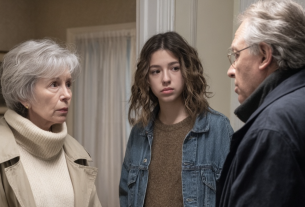When Anna first took her newborn daughter in her arms, the world fell still. The air in the delivery room seemed to grow denser, filled with emotions that defied words. The young mother’s eyes brimmed with tears—not from pain or exhaustion, but from that incredible, almost sacred force that is born the moment you first see your child. The midwife smiled, taking those tears for tears of joy. “How happy you are, Anna!” she said. Anna nodded, but in her gaze there was not only joy; there was also a deep, almost frightening anxiety. For the first time in her life she felt how love and fear can clench the heart at once.
Because the first thing that caught her eye were her daughter’s ears—large, expressive, as if nature had imbued them with special meaning. She immediately thought of Boris Petrovich, her uncle’s husband, after whom her own husband had been named. He was a legend in the family—respected, wise, strong of character. But he too had ears that drew smiles in childhood, teasing in youth, and gentle ribbing in adulthood. “So you’ve grown yourself a pair of wings!” people would say, and he would only smirk in reply. “Wings? Maybe antennas. I pick up thoughts without saying a word,” he would joke.
When his grandson Sergei was still little, he saw the cartoon about Cheburashka on TV for the first time. He pointed at the screen in delight: “Grandpa, look! He’s as handsome as you!” At first Boris Petrovich didn’t understand and asked, “Who’s handsome?” The boy, without a shadow of doubt, answered, “Well, Cheburashka, of course!” From that day on the nickname “Cheburashka” stuck to the old man like a shadow. He didn’t take offense. On the contrary—he laughed louder than anyone. But deep down he knew: appearance doesn’t make a person, yet the world often judges by it.
And now, years later, those very features appeared in his great-granddaughter—a tiny girl named Masha. Ears like her great-grandfather’s. Ears that carried not just genetic memory but a challenge—a challenge to society, to prejudice, to life itself.
Masha wasn’t just a girl. She was a force of nature. Bright, quick, with a sharp eye and an even sharper tongue. When I first happened to see her on the street—she was only two—I said, “Bye-bye, Mashenka!” She looked me straight in the eye and answered clearly and distinctly, “Good-bye,” and everyone around froze. You rarely hear such enunciation even from adults. But Masha had been special from the start.
When it was time for kindergarten, a boy, upon seeing her, blurted out, “Mom, look, a monkey!” I rushed to intervene to protect the child, but Masha was faster. She straightened, lifted her head proudly, and declared with dignity, “Not a monkey. I’m Cheburashka!” It became her motto. The only word she supposedly pronounced “wrong” was “Cheburashka,” which she said as “Cheburan’ka.” But when people corrected her, she gave the adults such a defiant look that they fell silent. “I’m not bothered that they call me Cheburashka,” she would say. “I’m bothered that you don’t know how to speak correctly.”
Relatives tried to “hide” her ears—styling her hair, picking hairdos, even suggesting headbands. But every time, Masha would toss her bangs back and say, “Let them be seen. That’s my charm. That’s me.” Her strength of spirit was astonishing. Anna, her mother, would look at her daughter and wonder: where did so much confidence come from in such a small person? Even Uncle Fyodor, a stern man not prone to flattery, once said, “We’ll be proud of this girl yet. I can feel it.”
But life wasn’t smooth for them. A few years later Anna and Sergei separated. The divorce was a tragedy. Sergei threatened to sue for custody of their daughter, citing his steady income, his apartment, and a “stable environment.” Anna, who worked as a librarian, was left without housing or support. Days turned into a string of tears, court hearings, and sleepless nights. Everything seemed lost.
And then, like thunder out of a clear sky, Boris Petrovich appeared. He came to the apartment where Anna and Masha now lived—to a door he had once considered not his. Masha refused to come out. She was afraid. But her great-grandfather didn’t give up. He went into her room, sat down beside her, and they talked. About what—no one knows. But when he left, Anna had an envelope in her hands. Inside was a bank card and a large sum of money. “For surgery, rehabilitation, and life,” he said. “You can change the PIN. And the money will come every month.”
Deeply moved, Anna suggested her daughter have plastic surgery. But Masha, already wise beyond her years, shook her head: “I don’t want it. It’s part of me. Let others love me for who I am inside, not for how I look.”
Years passed. Masha grew, studied, fell in love. She had plenty of admirers, but one—Pavel—became the only one. He didn’t see “Cheburashka” in her; he saw a strong, intelligent, warm woman. Their love was quiet but deep, like an underground river.
Sergei’s side of the family remained in the past. Her paternal grandmother never once called her granddaughter. Not on her birthday, not on New Year’s. Only Boris Petrovich stayed close. He not only sent money; he invited Masha for holidays. She didn’t come—but she called. Then they began to meet: first in ice cream cafés, then in elegant restaurants. He told her about life, about people, about the value of kindness. She told him about books, dreams, and her ideas.
When Boris Petrovich passed away, the funeral was grand. He was a man who had left his mark on the region’s history. And a few days later came the shock. The notary announced a will. No one knew it existed. And even fewer suspected its contents would blow the family apart.
To each son, grandson, and great-grandson—150,000. “To keep your pants up,” as Boris Petrovich wrote with sarcasm. And everything else—real estate, stocks, business assets, shares in companies, including international ones—went to a single heir: Maria Sergeyevna, his great-granddaughter.
The room fell silent. Someone gasped. Someone clenched their fists. One of the great-grandsons, her cousin, jumped up: “Grandpa lost his mind!” But the notary replied calmly, “Boris Petrovich underwent a full medical examination. He was of sound mind and firm memory. The will is legally impeccable.”
Everyone was silent. At the center stood a slender young woman with big ears—someone many had considered “odd,” and now the heiress to an entire fortune.
“Maria Sergeyevna,” the notary said, “there is also a letter for you.”
She stood. She thanked them. She walked past her relatives, whose faces burned with anger and envy. She stepped out into the life of the big city, still in motion all around her.
She walked until she reached a fountain. She sat on a bench and opened the envelope. Inside were just a few lines:
“My dear ‘Cheburashka’! You may do with your ears whatever you deem necessary.”
Masha smiled. She lifted her eyes to the sky, as if she knew he was watching.
“Whatever I deem necessary?” she whispered. “Nothing. I’m fine as I am,” and she laughed softly.
She didn’t change her life. She stayed on at the library, like her mother. But now—with new possibilities. She transformed the outdated building into a modern cultural center: with a space for children, exhibits, lectures, and film screenings. She helped children with special needs, fought bullying, and created support programs.
Her story became public. Local media wrote about her as a symbol of strength, dignity, and compassion. She married Pavel, and they had two children. Her son inherited the famous ears. And Masha would say proudly, “Look how much you look like your great-grandfather. He was a great man. And you—will be even greater.”
She handed the businesses over to professionals. She herself devoted her life to public work. A few years later she wrote a book—I Am Cheburashka. And I’m Proud of It. The book became a bestseller. People with unusual appearances wrote to her: “You gave us the courage to be ourselves.”
By thirty, Masha had proved that appearance does not define a person. True beauty lies in strength of spirit, in the ability to love, to forgive, to change the world. She became a legend—not because she inherited a fortune, but because she inherited a heart.



